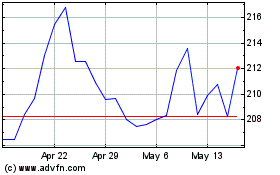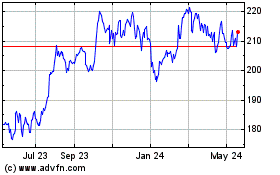LSE Suitors Likely to Face Antitrust Hurdles
02 March 2016 - 7:54AM
Dow Jones News
By Shayndi Raice, Tim Cave and James Rundle
The most coveted asset owned by the London Stock Exchange Group
PLC could also be what brings down any deal to buy it.
A potential bidding war for LSE emerged Tuesday between
Intercontinental Exchange Inc., CME Group Inc. and Deutsche Börse
AG. Analysts agree that any of the three buyers would have to
persuade authorities that a combination of their clearinghouse
businesses with LSE's can pass antitrust muster.
LSE's clearinghouse business, LCH.Clearnet, is the dominant
clearinghouse for interest-rate swap derivatives globally and the
part rivals want most.
Clearinghouses are supposed to help prevent a marketwide
collapse by ensuring that trading partners get paid even if one of
them defaults.
ICE said Tuesday it was considering bidding for the U.K.
exchange, a week after Germany's Deutsche Börse said it was
pursuing a merger with LSE. CME Group is also considering a bid,
according to a person familiar with the matter.
European regulators have traditionally been concerned about an
exchange becoming too large in any of its business lines, for fear
that pushes up fees for customers. Trade clearing businesses are
also systemically important, meaning regulators will carefully
assess one party amassing too much power or housing too much
risk.
Both Deutsche Börse and ICE own derivatives clearinghouses. But
Deutsche Börse's focuses on listed products, while LSE's focus is
on over-the-counter swaps. ICE's European clearing operation, ICE
Clear Europe, is dominant in credit, energy and commodity
derivatives, which also includes financial futures, after its
purchase of NYSE Euronext's Liffe exchange.
CME in the U.S. accounts for around 40% of swaps clearing, with
the remainder processed by LCH. CME has made a push into Europe in
recent years with the opening of a derivatives exchange, CME Europe
in 2014, and a clearinghouse in 2011.
Because of the overlap, some analysts believe problems could
arise with any bidder.
"On the clearing side, any combinations with the LSE would, I
believe, gather some close scrutiny," said Richard Repetto, an
analyst with Sandler O'Neill + Partners LP.
But from a political perspective, a deal with Deutsche Börse and
LSE could appease European regulators who want an exchange
powerhouse in Europe.
Another political plus for a German and U.K. tie-up is that it
would create the largest equity market operator in Europe,
unseating Bats Europe, which leads exchanges by value traded. Bats'
market share of EU equity trading by value was 21.19% in February,
while the LSE's was 17.69%, and Deutsche Börse's 9.5%, according to
figures from Bats.
Since the financial crisis, regulators have promoted clearing in
derivatives markets, particularly in interest rate swaps, since it
is designed to reduce the risk of defaulting on a trade. Some
analysts believe the deal could give regulators an opportunity to
push ICE to provide open access, allowing market participants and
rivals access to its index, data, clearing and other products
through commercial partnerships.
The European Commission blocked a deal between Deutsche Börse
and NYSE Euronext in 2012 over concerns it would create a
quasimonopoly in European derivatives traded on exchanges.
But Spencer Mindlin, an analyst with Aite Group, thinks the
industry may now have enough competition to warrant some
consolidation.
"There are plenty of competitors, he said. "That competition
didn't necessarily exist five or 10 years ago."
Write to Shayndi Raice at shayndi.raice@wsj.com
(END) Dow Jones Newswires
March 01, 2016 15:39 ET (20:39 GMT)
Copyright (c) 2016 Dow Jones & Company, Inc.
CME (NASDAQ:CME)
Historical Stock Chart
From Sep 2024 to Oct 2024

CME (NASDAQ:CME)
Historical Stock Chart
From Oct 2023 to Oct 2024
